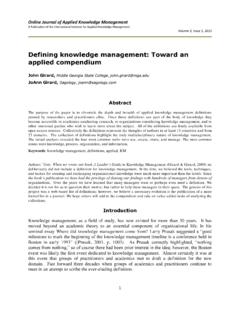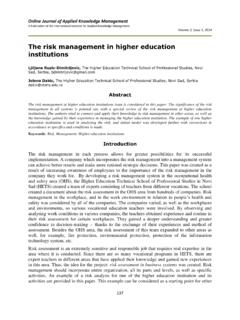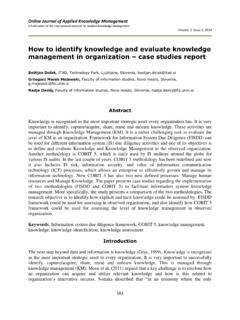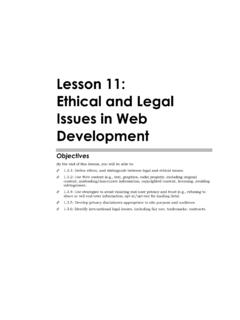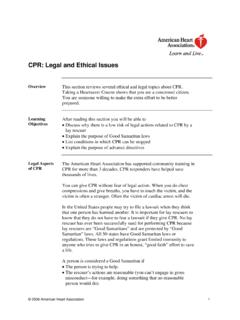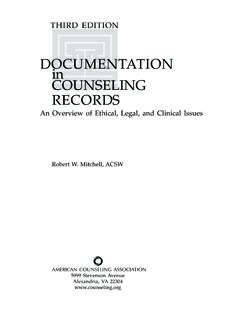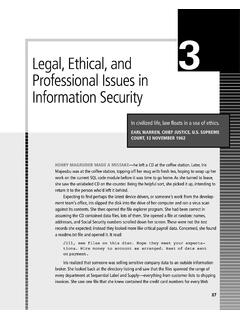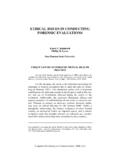Transcription of Legal and ethical issues of employee monitoring
1 Online Journal of Applied Knowledge Management A Publication of the International Institute for Applied Knowledge Management Volume 1, Issue2, 2013 44 Legal and ethical issues of employee monitoring Johnathan Yerby, Middle Georgia State College, Abstract Many questions about employee workplace monitoring produce complex answers. For example, what is employee monitoring , who is doing it, and why are employers doing it? This paper will explain what employee monitoring is, how organizations can learn what types of activities users need, and why there is a need for the monitoring .
2 This paper will also discuss one or two types of employee monitoring . This paper addresses the Legal and ethical issues involved when observing someone in a work environment. The paper will give employers strategies and practices for monitoring employees for improved organizational performance. Keywords: employee monitoring , Legal , ethical , management. issues of employee monitoring : What is Appropriate? Should companies monitor employees while at work? What actions should the companies monitor? What types of monitoring are acceptable?
3 A report by the Office of Technology Assessment, defines computerized performance monitoring as, the computerized collection, storage, analysis, and reporting of information about employees' productive activities (Peters, 1999). The practice of monitoring a company s workers is a controversial practice that is undeniably on the rise (AMA, 2008). When it comes to the subject of employee monitoring there is a grey area; current laws mandate that monitoring is Legal , yet the questions of effectiveness and ethics arise.
4 Organizations must monitor employees to protect both the company as well as the employee , but organizations must also give diligent attention to the ethical treatment of employees (Bezek, Britton, 2001). Bhatt (2001) describes employee monitoring and knowledge management by pointing out that many organizations believe that by focusing exclusively on people, technologies, or techniques, they can manage knowledge. Such a strategy will not allow a firm to maintain a competitive advantage. Organizations must create an environment of accountability and transparency to operate effectively (Bhatt, 2001).
5 At the beginning of the 21st Century, the world and more specifically the United States has gone from an Industrial Age to an Information Age (Hart, 2000). At the dawn of the Internet Age, employers face serious risks from employee abuse of this relatively new communication medium. To limit these risks, Frayer (2002) suggests that employers are using innovative monitoring technology, which enables them secretly to view, record, and report literally everything employees do on their computers. Nowadays, increasing numbers of employees use computers to perform work tasks.
6 Of the 50% to 75% of workers having access to a computer, approximately 85% have internet access (AMA, 2008). With computers being so regularly available to such a wide spectrum of people with a diverse sense of work ethics, knowledge, and varying intentions, employers feel forced to monitor the activities of their employees. Online Journal of Applied Knowledge Management A Publication of the International Institute for Applied Knowledge Management Volume 1, Issue2, 2013 45 E-mail and the Internet are integral parts of the typical worker's daily routine.
7 Because of its speed and overall convenience, e-mail has replaced the inter-office memorandum as the preferred method of communication in corporate America. Therefore, many employees are using e-mail and the Internet for just business. However, the problems arise when employees use business resources for non-business related tasks. Therefore, businesses are responding to Legal risks by proactively combating problems of employee non-work Internet use. The proactive step that businesses are taking is to monitor the activities of their employees, more specifically monitoring employees electronic activities (Bezek, Britton, 2001).
8 As reported by Court (2004), numerous employers across the nation utilize some form of employee monitoring . Court cites statistics of Internet and e-mail misuse by workers, and potential liability traps, as the main reasons for employee monitoring . The employee monitoring in many cases is there to protect the business from Legal liability, as well as to produce a more efficient employee . An article, discussing citizen s privacy, reports that over three-quarters of major corporations collect information on employees by various means: videotaping, monitoring Internet and e-mail use, or hiring outside investigators (Marshall, 2001).
9 As of January 2008 only two states, Delaware and Connecticut, require employers to notify employees of monitoring , the remainder of the nation does not have specific laws requiring employee notification. According to the 2007 American Management Association survey (AMA, 2008) 83% inform workers that the company is monitoring content, keystrokes and time spent at the keyboard; 84% let employees know the company reviews computer activity; and 71% alert employees to e-mail monitoring .
10 As described by McEvoy (2002), one problem with workplace monitoring is that despite employers informing employees about monitoring , many employees still let their guards down and commit acts subject to disciplinary action. Companies provide more employees with Internet access and e-mail at work, which gives them a new way to cause potential problems for their employers. To address the problem on employee computer misuse, many businesses implement systems to monitor the actions of their employees.
